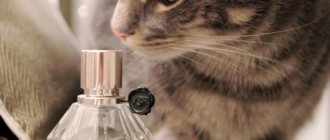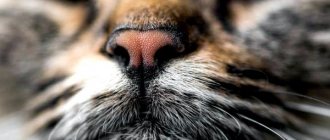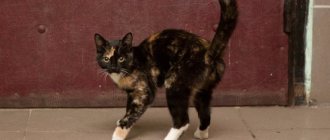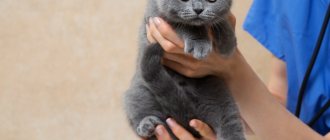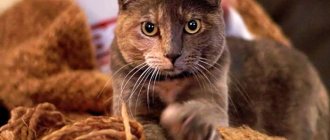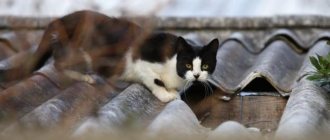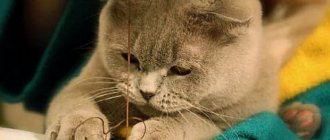An Arsenal of Cats' Unloved Smells
Despite developed vision, the sense of smell is also important for furry pets. Thanks to the ability to distinguish smells, cats are perfectly oriented in their surroundings, mark their territory and communicate with each other.
All odors surrounding your pet can be divided into several categories:
- Pleasant. So, the smell of sweat on the owner’s clothes calms the cat, she knows that he is nearby. Catnip and valerian excite, as they are similar to the hormones of furry pets. Also read about grass for cats.
- Repelling - any strong aroma has a repulsive effect, and there is a direct dependence on the intensity - the higher it is, the more unpleasant the smell.
Using this feature, you can use different scents to teach your cat good manners or wean them from bad ones.
Products are herbal or artificial based.
Also read: Why cats are afraid of water.
Plant-based sources of unpleasant odors
Such means include:
- Garlic and onion cloves. They secrete phytoncides that irritate the nasal mucosa, which forces the animal to move as far as possible from the source of the unpleasant odor. To enhance the effect, it is recommended to finely chop or grind to a paste-like consistency. Prepared portions of onions and garlic should be placed in places that are subject to “attacks” from your pet. But it is important to consider that the aroma from these products is strong and will be noticeable not only to animals, but also to people. As the specific odor disappears, it is worth replacing with a fresh portion.
- Any spices: cinnamon, coriander, pepper, curry, etc. make your pet want to run away. They can be used in several ways: rub surfaces or make a mixture based on them. Add 1-2 teaspoons of spice to 200 ml of water, stir and spray on areas that need protection from animals.
- Oil from the leaves of the rue bush works well to repel furry pets. A few drops applied to problem areas will help in weaning from bad habits.
- Many essential oils have similar effects. Lavender or rosemary based oil applied to surfaces will repel the animal.
- All citrus fruits (orange, lemon, tangerine, etc.) will help cope with your cat’s bad habits. The smell of lemon is especially unpleasant for them, but the rest are difficult to tolerate. You can also add juice to water and use a spray bottle to treat surfaces or place fruit slices in the right places. The animal will avoid them.
- The smell of coffee is also hated by cats, which can be used to your advantage.
To eliminate the unpleasant odor and wean the animal from shitting in inappropriate places, you can use a combination of some of the above remedies.
For example, pour lemon juice over coffee grounds or sprinkle with essential oil and place in the right place. Living lavender or rosemary plants placed on the windowsill will wean your pet from spoiling other plants nearby.
Perfumes and special products
Any product from the perfume industry, be it expensive perfume or cheap deodorant, has an equally repulsive effect on cats. The stronger the smell, the more disgust it causes. If the composition contains the aroma of citrus or lavender, this will enhance the effect.
Vinegar is extremely unpleasant for cats; you can add 2-3 drops to water and wipe the surfaces that need protection. People will not feel a special aroma from such a concentration, but this will be enough to scare away the animal.
Pet stores provide a fairly wide range of factory-produced sprays and liquids to wean cats from bad habits. For example, the spray “Repel? Yes!" or "Biovax". They contain special fragrances and enzymes that help in the fight against pet leprosy.
Also read the article: Antigadin for cats.
A subtle sense of smell is an ally in the fight against a cat’s bad habits
Knowing which scents tailed purrs like and which they don’t, you can wean them off something and get used to something. Using repellent odors, you can wean your cat off:
- go to the toilet in unauthorized places;
- spoil furniture;
- mark territory;
- climb in inappropriate places.
To wean your tailed pet from bad habits, follow a simple scheme - first remove the cat smell, and then apply a repellent scent to the problem area.
When weaning your cat from actions that it should not do, provide it with an alternative where it can be done. For example, if your purr sharpens her claws on a new sofa, treat it with an unpleasant smell for her, while providing her with a claw clipper for this purpose. Do not be upset if your pet does not understand what is required of her the first time, be patient and then the result will not be long in coming.
How to use “aromatherapy” to rid entryways of cats
If there is a street cat in the entrance, then it causes a lot of problems. Among the most common are: an unpleasant odor from the animal’s urine and feces, “screams” in the middle of the night and the rotting remains of half-eaten food. But you can get rid of uninvited guests in the form of cats using their dislike for certain scents. They evoke in animals an instinctive feeling of danger, anxiety and fear, forcing them to get out of their favorite entrance.
Essential oils and vinegar can best help with this. Since the entrance is a fairly large area, it will be more convenient to treat it with liquid.
To prepare it, take water and add a few drops of vinegar or any essential oil (preferably lavender or citrus), pour it into a spray bottle and spray it on the walls and floor of the entrance.
This will get rid of uninvited residents.
Pheromones
Scientists have divided pheromones, which are synthesized by glands on the animal’s face, into several groups:
- F 2 – left by animals as a message indicating readiness to mate.
- F3 is a kind of “Ariadne’s thread” that helps you find your way home. This smell marks familiar objects and helps to navigate in space.
- F4 – scent that reduces aggression. Cats exchange them when they meet, mark people and animals they know and like. With its help, cats smooth out conflicts.
The meaning of pheromones F1 and F5 has not yet been determined, but for cats they also mean something.
Composition of odorous substances. The composition of pheromones includes low-molecular odorous substances (organic acids):
- palmitic;
- iso-oil;
- aminovaleric;
- azelaic;
- hydroxyphenylacetic, etc.
Nepetalactone, which is part of the essential oil of catnip (“catnip”), and actinidin, contained in the roots of valerian officinalis, resemble the smell of a cat in heat.
Therefore, the corresponding plants “delight” mature cats and are not at all interested in kittens, as well as most cats.
Repelling cats when they defecate on the bed
Pets bring not only joy to their owners, but also inconvenience, starting to “misbehave” in the apartment, for example, by choosing a secluded place in the bedroom that is not intended for the toilet.
Before you start weaning your animal from such an unpleasant habit, you need to find out why it does it. Among the main reasons for this behavior are:
- Protest. When a pet is scolded or punished for something, it develops stress, and with such behavior the animal shows its disagreement.
- If there are problems with the genitourinary system, the act of emptying the bladder can be painful and the cat looks for a more comfortable and soft place for the toilet.
- Young kittens are often afraid to get out of bed on their own or do not remember where the toilet is, which leads to bowel movements in the bed.
- Some especially clean individuals do this when their tray is full; you should pay attention to the regularity of changing the filler in it and the problem will be solved.
- Cats whose owners are rarely at home or pay little attention to them begin to get bored and try to attract attention and diversify their lives with this behavior.
- Many elderly pets, having lived in a family for a long time, suddenly begin to shit on the bed. This is not due to a deterioration in character, but to the aging of the body; the animal could simply not have time to reach its tray in time.
- Cats are terrible owners, and the bed smells like the owner; by peeing on it, they mark their territory.
Dealing with “indecent” pet behavior
Having understood the reasons for this behavior of your pet, it is much easier to understand what motivates him at the moment of dirty tricks and begin to fight it. In order to minimize stress, you should be more attentive to the animal, caress it, and play more. Keep the toilet clean and wash it more often, install additional trays with other types of litter.
You can use essential oils or wash clothes with a fabric softener that has a lavender or citrus scent. But it is worth considering that not only people, but also animals have allergic reactions, so you should use the products carefully. A few drops of oil can be applied to the bed frame.
It is possible to wean an animal from the bad habit of relieving itself on the bed with the right tactics.
Advantages and disadvantages of antigadin
Like any drug, antigadin has advantages and disadvantages.
The obvious advantages of the drug include:
- Harmlessness. The manufacturer claims that the spray is completely safe for humans and animals.
- Natural composition. The main component of the product is enzymes, the aroma of which is usually felt only by pets.
- Ease of use. Antigadin is available in the form of a spray. Simply apply it to the desired surface and the product will work.
- No side effects. This transparent composition does not leave stains even on clothes and upholstery.
- Economical. The drug has a low price compared to imported analogues.
- Application area. Antigadin is universal and can be used for animals of any age and applied to any surface.
But this composition also has obvious disadvantages:
- It is not suitable for all pets; its effect is individual. Some kittens stop pooping even after one use of the product, others act as if they do not feel its influence at all.
- To develop a stable reflex and consolidate the result, the drug usually needs to be used for several days or even weeks. So, buying one bottle is not enough here.
- In some animals, the drug causes irritation, sneezing, and allergies.
- Although the manufacturer claims that a person is not able to smell the product, some people perceive it very negatively. There were no cases of obvious problems with the health of household members.
Mr. Cat warns: danger to people
Rut oil is an effective remedy in the fight against bad habits of cats. But you need to know that if it is used in excess, the owners may experience unwanted reactions from the skin:
- development of allergic scabies;
- the appearance of urticaria;
- signs of allergic dermatitis.
When using this oil, you should adhere to the rule - the less, the better.
How to protect plants from cats
When cats mark territory, a special secretion is released along with urine, which, when it gets on the leaves of plants and flowers, spoils them. Many animals like to sleep in beds and flower beds and organize a toilet there, digging up the soft soil. This causes a lot of grief to owners of plots and gardens. Scratched tree trunks don't add joy either. But it is possible to fight such hooligans. It is enough to plant along the edge of the plot or on the windowsill where there are flowers, onions or garlic.
Ornamental plants will also come to the rescue. For example, lavender, which will not only repel cats, but will also decorate the area.
1111
"Love does not love"
“Favorite” smells for cats are those that tell them about the presence of food (the aroma of raw beef, chicken entrails, fish remains) or the presence of a sexual partner. Most cat scents that are attractive to humans are frightening or repulsive. Knowing the characteristics of a cat’s perception of odors, you can protect furniture, textiles, and carpets from the encroachments of a furry pet.
Least favorite smells. Cats don't like the smell:
- citrus fruits;
- fragrant rue;
- eucalyptus;
- myrtle tree;
- Schisandra chinensis;
- tobacco and shag;
- Coleus dog;
- mustard;
- cayenne pepper;
- ground coffee and pepper;
- vinegar;
- perfume and cologne;
- laundry and tar soap.
